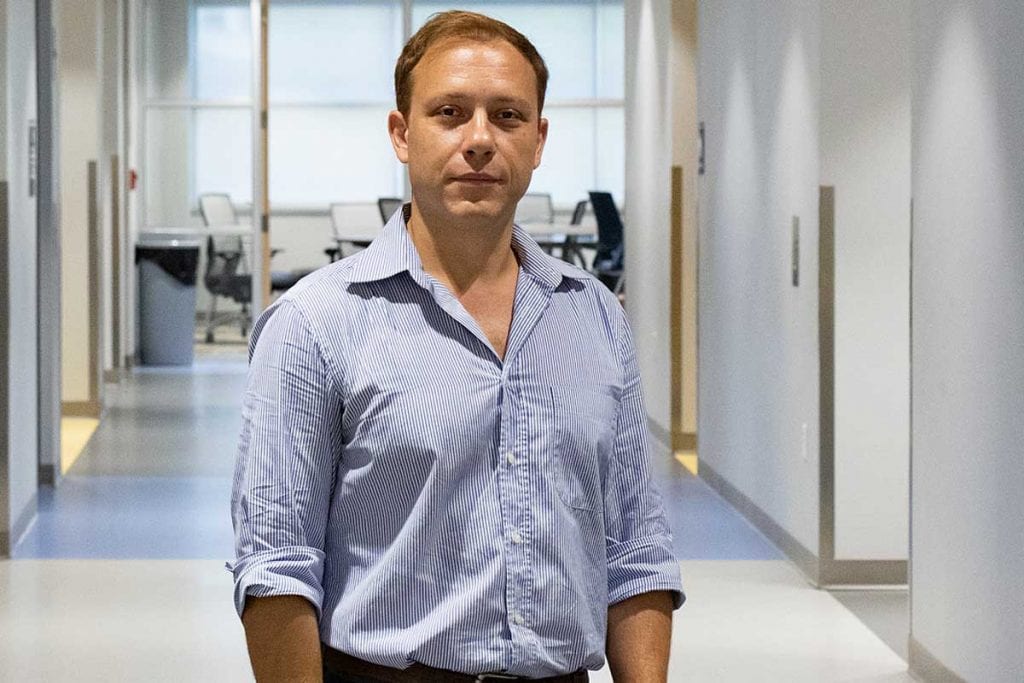General Intelligence Won’t Be Enough to Prevent Ecological Disasters, UCF Study Finds

BY ROBERT WELLS
High IQs aren’t going to be enough to stop an ecological disaster. It’s going to take social intelligence, too.
That’s the conclusion of a new study co-authored by a University of Central Florida researcher and published Wednesday in the journal Nature Communications.
The findings could help identify why some groups better manage shared resources, such as water or fisheries, than others. And as Earth’s population is growing at a rate that is putting a strain on resources, finding ways to better manage them is critical.
“Especially in the case of common property, there is often an inbuilt tension between what is good for the individual and what is good for the group,” says Jacopo Baggio, an assistant professor in UCF’s Department of Political Science and lead author of the study.
“Individuals often have different cognitive abilities,” Baggio says. “For example, individuals with high general intelligence will be more able to discern patterns and dynamics of resources, and individuals with high social intelligence communicate more effectively and understand the mental state of others.”
Using a digital game to simulate a virtual ecosystem, the researchers found that when teams of people with high general intelligence, but low social intelligence faced a situation where resources became scarce, those teams depleted resources faster, harvested less potential resources and pushed the ecosystem to its limits.
But when both general and social intelligence were high, teams harvested a greater percentage of potential resources and kept the ecosystem from collapsing.
“It’s a way to really start to understand how individuals and groups interact and what type of individuals are more prone or less prone to favor group benefits over individual costs,” Baggio says.
General intelligence helped people figure out the rules of the game and how the resources, in this case digital tokens, regenerated, while social intelligence helped people cooperate to optimize performance, says Thomas Coyle, co-author of the study and professor of psychology at the University of Texas at San Antonio.
“In theory, people with higher levels of social intelligence are more effective in reducing conflict among group members and in getting people to work toward common goals,” Coyle says. “Such ‘people’ skills are important for managing shared resources.”
The work points to a need for education in diverse types of intelligence, says Jacob Freeman, an assistant professor of anthropology at Utah State University and study co-author.
“It suggests that our education systems should focus on cultivating both general and social intelligence to better equip groups to deal with complex, social-ecological challenges,” Freeman says.
Coyle says researchers are still exploring ways to improve social intelligence.
For the study, the researchers used a digital game where people collected virtual tokens in exchange for actual money. Participants were 216 undergraduates from two large universities in the Western United States. They were randomly placed into one of two experimental conditions: either a game where the conditions began improving and tokens continued to be replenished, or one where conditions began deteriorating and tokens did not regenerate fast enough.
General intelligence was represented by ACT and SAT scores provided by the universities. Social intelligence was measured using a short story test that estimated the ability of individuals to infer others’ intentions and feelings. The test is often used to predict social communication disorders, communication errors and the ability to infer the mental states of others.
Baggio is a member of UCF’s Department of Political Science and is a core member of the Sustainable Coastal Systems Cluster and the National Center for Integrated Coastal Research. He received his master’s in development economics and doctorate in international development from the University of East Anglia. He joined UCF in 2018.
Study co-authors also include Tam The Nguyen, a research assistant at Auburn University; Dale Hancock, a graduate of the psychology master’s program at the University of Texas at San Antonio; Karrie Elpers, a psychology doctoral student at the University of Texas at San Antonio; Samantha Nabity, an anthropology student at Utah State University; H.J. Francois Dengah II, an assistant professor of cultural anthropology at Utah State University; and David Pillow, a professor of psychology at the University of Texas at San Antonio.
